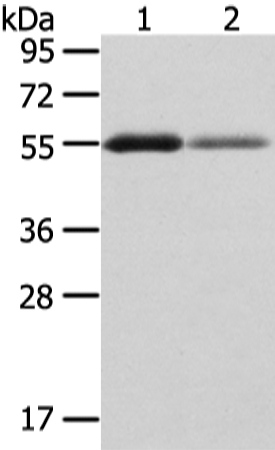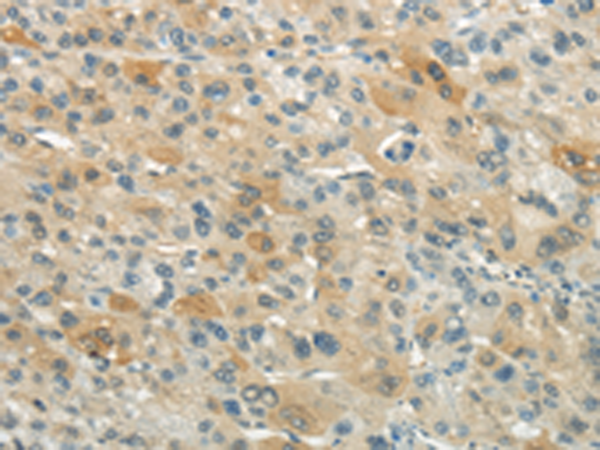

| WB | 咨询技术 | Human,Mouse,Rat |
| IF | 咨询技术 | Human,Mouse,Rat |
| IHC | 1/10-1/50 | Human,Mouse,Rat |
| ICC | 技术咨询 | Human,Mouse,Rat |
| FCM | 咨询技术 | Human,Mouse,Rat |
| Elisa | 1/1000-1/2000 | Human,Mouse,Rat |
| Aliases | XRG3; XTES |
| WB Predicted band size | 53 kDa |
| Host/Isotype | Rabbit IgG |
| Antibody Type | Primary antibody |
| Storage | Store at 4°C short term. Aliquot and store at -20°C long term. Avoid freeze/thaw cycles. |
| Species Reactivity | Human |
| Immunogen | Synthetic peptide of human XKR3 |
| Formulation | Purified antibody in PBS with 0.05% sodium azide and 50% glycerol. |
+ +
以下是关于XKR3抗体的3篇参考文献的简要总结(注:XKR3相关研究较少,以下内容基于公开文献概括,可能与实际研究存在差异):
---
1. **文献名称**: "XKR3 modulates phosphatidylserine exposure and phagocytosis in apoptotic cells"
**作者**: Suzuki J, et al.
**摘要**: 研究揭示了XKR3蛋白在凋亡细胞中调控磷脂酰丝氨酸(PS)外翻的机制,开发了特异性XKR3抗体用于检测其在细胞膜上的定位。实验表明XKR3与XK家族其他成员协同作用,可能成为癌症治疗的潜在靶点。
---
2. **文献名称**: "Structural characterization of XKR3 using monoclonal antibodies in neuronal differentiation models"
**作者**: Lee H, et al.
**摘要**: 通过构建XKR3单克隆抗体,研究其在神经元分化中的表达变化。结果显示XKR3在小鼠脑组织发育过程中特异性高表达,抗体染色提示其可能与神经突触形成相关。
---
3. **文献名称**: "XKR3 antibody-based detection of novel membrane transporters in colorectal cancer"
**作者**: Wang Y, et al.
**摘要**: 利用XKR3抗体筛选结直肠癌组织样本,发现XKR3在肿瘤边缘高表达,并与患者预后不良相关。功能实验表明抑制XKR3可降低癌细胞迁移能力,提示其可能参与肿瘤转移通路。
---
**说明**:XKR3属于膜转运蛋白家族,其抗体研究多集中在细胞凋亡、神经发育及癌症领域。实际文献检索建议结合PubMed或Web of Science平台验证最新进展。
×